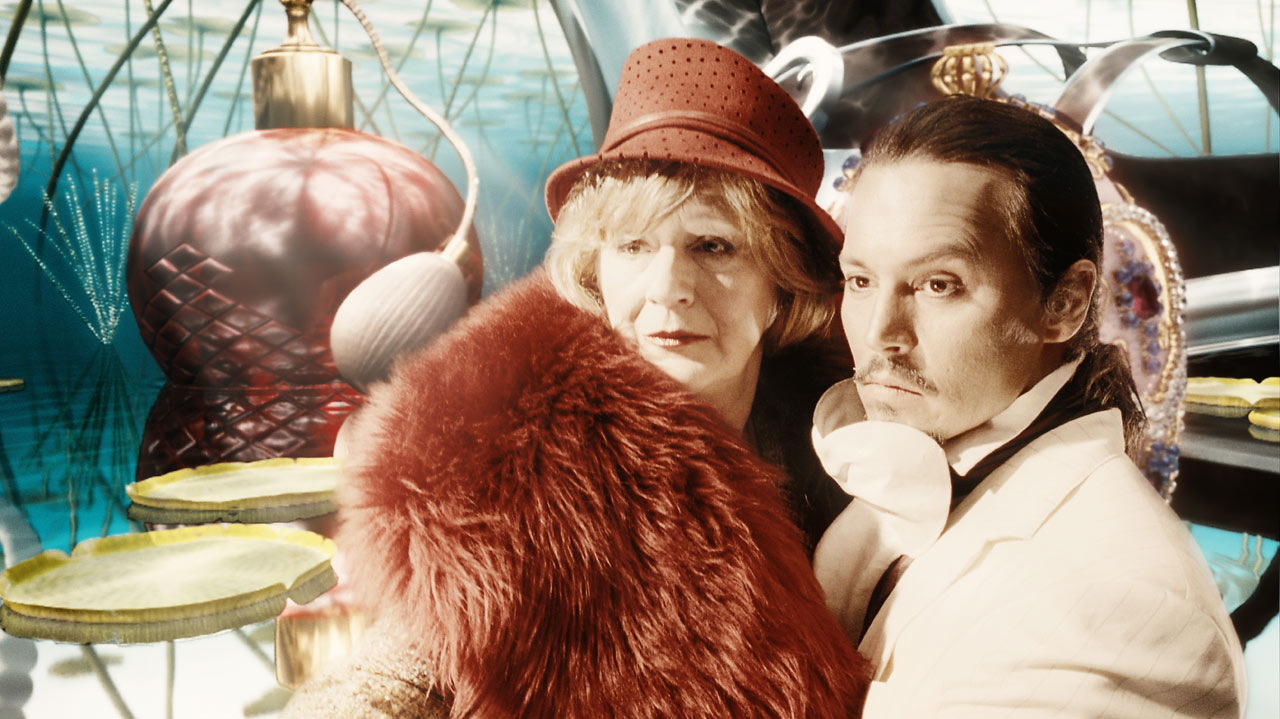The Imaginarium of Doctor Parnassus
Terry Gilliam's career has been a bit of a wooly thing, flitting from genre to genre and flirting with the mainstream without ever quite consummating the relationship. His best film to date remains Brazil, a dystopic masterpiece that's bookended by another pair of singular accomplishments — the well-regarded fantasy adventure Time Bandits and the less-celebrated epic The Adventures of Baron Munchausen. (A book, Losing the Light, was written about bringing that oversized project — a must-see for anyone who interested in expansive, expensive whimsy in the days before CGI — to the screen.) He next made The Fisher King, a nicely written (by Richard LaGravenese) romantic comedy with the hint of madness around the edges, with Jeff Bridges and Robin Williams, and then snared Bruce Willis and Brad Pitt for his big commercial triumph, a feature-length extrapolation from Chris Marker's brilliant science-fiction short "La Jetée" called Twelve Monkeys. For an encore project, he moved in as a fix-it artist on a troubled Hunter S. Thompson biopic, completing the Johnny Depp vehicle and instant stoner classic Fear and Loathing in Las Vegas. And with that, his future in the industry seemed assured.
And then the bottom fell out.
Gilliam's next movie, The Man Who Killed Don Quixote, ended up being a big black hole of a project, its shooting schedule disrupted and finally derailed by bad weather and illness. Earned or unearned, Gilliam's reputation for being a difficult collaborator (he famously fought with the head of Universal, Syd Scheinberg, to save Brazil from a disastrous studio cut, and the oversized Munchausen was essentially dumped by Columbia, which was at the time a studio under new ownership, making it a pre-ordained flop) bit him on the ass and he got a rap as a cursed director. It took a while to get back to features, and the resulting project — The Brothers Grimm, starring Heath Ledger and Matt Damon — should have been an easy commercial triumph. But it was a troubled production (Gilliam is said to have clashed with the Weinstein Brothers on a variety of fronts, including Gilliam's original idea of casting Depp in Damon's role and even his choice of cinematographer) and took ages to get sorted out in post.
While Grimm stewed, Gilliam went out and shot Tideland, easily his darkest movie to date and one that managed to repel some of his biggest fans. (And it's a good film.) Through it all, Gilliam had his partisans, and managed to maintain a modest fan club in the industry. And so, with Heath Ledger attached to star, Gilliam and frequent collaborator Charles McKeown managed to fund production of an original screenplay, The Imaginarium of Doctor Parnassus, that looked like it could be a home-run comeback.
Talk about a failure to catch a break. Ledger's death halfway through filming threatened to demolish the whole endeavor, which was funded based on his participation. Miraculously, Gilliam found an out, pulling in three of Ledger's Hollywood friends -- Depp, Colin Farrell, and Jude Law -- to finish his job. It's not as crazy an idea as it sounds. In trademark Gilliam fashion, Parnassus depicts a dance back and forth across the boundary between parallel universes, its narrative flitting between the real world and the realm of the imagination. (Eerily enough, the story kicks into gear with the discovery of the body of Ledger's character, Tony, hanging from underneath a bridge. Tony's lifelessness turns out to be an illusion.) When he died, Ledger had finished his work on the portion of the shooting script that took place in contemporary London. What remained to be shot were the fantastic internal landscapes of the mind that could be accessed by passing through a magical mirror owned by Doctor Parnassus (Christopher Plummer), the aging figurehead of a traveling theater company.
Once on the other side of that portal, human men and women are invited to make decisions that align them with the forces of good or evil -- virtue or depravity -- in the universe. It would be possible, Gilliam determined, to shoot the film as if Ledger's character, already a shifty, difficult-to-pin-down fellow, transformed his appearance and demeanor every time he crossed that magical border, chaperoning a new mark's journey into that land of dreams. In our world, he's Heath Ledger. When he steps through the mirror, he's Johnny Depp. He comes back home, and he's Heath Ledger again. Steps through, and now he's Jude Law. Then Colin Farrell. It's a Band-Aid on a bullet wound, sure. But it's a little bit brilliant.
You could watch the film and have no idea that Gilliam essentially reworked it in the eleventh hour with duct tape and elbow grease. If anything, you might look at the unusual casting gambit as a director's ambitious strategy for attaching multiple stars to the film. It works -- Depp's sly, subtly comic performance as the first of Ledger's alter-egos is actually a highlight; later on, Farrell's alternate-universe extrapolation on the same character (kind of a 21st century Harry Lime) turns out to be the best of the three. But because we know the film's backstory, the scenes featuring Ledger's surrogates take on a bittersweet yet almost celebratory feel, combining otherwordly acid trip and joyous elegy. There's something undeniably stirring about the spectacle on screen, and it elevates the whole project.
What Gilliam delivers, straight-up, is a fanciful yarn about Parnassus, an old dramatist and obvious Gilliam surrogate, who has an unusually cordial relationship with the devil, known here as "Mr. Nick" (Tom Waits in the kind of performance that requires a pencil-thin mustache and a bowler hat). Parnassus, whose circle of colleagues includes the young actor Anton (Andrew Garfield), his lovely daughter Valentina (Lily Cole), and his diminutive assistant Percy (Verne Troyer), has grown old enough to feel obsolete — he bitches about how little the new generations care for storytelling. As it turns out, Parnassus has been dealing with Nick for many, many years — first gaining the prize of immortality, then trading it away for youth, which allowed him to win the heart of a woman. In exchange for that favor, Parnassus agreed to give up his first-born daughter, Valentina, at the age of 16. That makes him a very bad parent indeed, but with one last chance at redemption. Itching for a new wager, Nick has shown up with another offer, this one involving a competition for the fate of souls visiting the imaginarium. If Parnassus can get just five souls to step through the mirror and do the right thing, he wins Valentina back. Meanwhile, Nick will be tempting them to embrace the dark side.
All this exposition isn't handled with the greatest finesse — finesse, per se, never having been a Gilliam strength — but story and dialogue aren't the main attraction here. What's most commanding on screen is Gilliam's vision running at full throttle, enabled by an arsenal of CG workstations churning out fantastic, candy-colored panoramas that match up to different bit players' ideas of paradise — or, more to the point, they portray what Gilliam, as commandeer in chief of their imaginations, thinks a bit player's idea of paradise might be. When the troupe suffers from a lack of paying customers, it's Tony's idea to move the show indoors. In a triumph of pure marketing, the imaginarium sets itself up at what looks like a shopping mall (actually London's historic Leadenhall Market), Valentina perches on stage beneath an apple tree in not a stitch of clothing save for a spectacularly and strategically flowing wig, and Tony gets to the business of seducing shoppers from the stage.
The first woman who steps through the mirror ends up escorted by Depp through a land of gigantic ladies' shoes and perfume bulbs. She is delighted. Garish as they are, the film's massively indulgent looking-glass fantasias give Parnassus a lot of juice, and some of the images call back to Gilliam's own youth — one of the world's has a Munchausen-style hot air balloon (quickly deflated) and another features a squadron of stockinged dancing policemen that explicitly recalls his Monty Python days — turning the film into a high-tech visual echo chamber where traces of the director's early career as a cut-out cartoonist reverberate.
Make no mistake -- the screenplay is a mess. And that matters, because while Parnassus is at least engaging on its own terms, I kept getting the sense that with a little more cohesion and discipline in the script, a little more attention paid to traditional story structure, it could have been another landmark in Gilliam's career. But it's not a dealbreaker. I recapped Gilliam's filmography because it illustrates something about his work. With The Fisher King and Twelve Monkeys, Gilliam answered critics who doubted he could knuckle down and work somebody else's expert screenplay, turning out two delightfully tweaked yet highly commercial riffs on Hollywood genre filmmaking. But those results raise a more difficult question: they are the most commercially successful films of his career, but are they the most valuable?
I still think there's something special about The Fisher King — a genuineness that Gilliam brings to the film's deranged-fantasy overtones — but any number of directors could have made something of that script, and Twelve Monkeys was probably even less personal. The indelible, irreplaceable moments of his career don't come from those films. When I think Gilliam, I think about young Kevin's parents exploding at the end of Time Bandits, the lobotomy that climaxes Brazil, the emergence of a nude Uma Thurman from a seashell, angels draping her with clothing, in Vulcan's chambers halfway through Munchausen. Not to mention the unexpected, disconcerting presence of Jeff Bridges, decomposing, throughout the latter half of Tideland.
Years from now, any number of moments from Parnassus could fit into that progression — I might nominate the magnificently, vertiginously realized sequence featuring Jude Law's character staggering across a landscape of gently curvy Gilliam hills, using two halves of a stepladder-to-the-skies as stilts. So while I briefly pined for a Parnassus script with an actual protagonist rather than just a loose collection of characters, or one that eked more mileage out of its deal-with-the-devil conceits, on consideration I'm not sure I'd want to see another Gilliam story that had been worked into one of the traditional formulas by an expert script masseuse. The Imaginarium of Doctor Parnassus may be disorganized and too loosey-goosey for its own good, but it's hardly boring. It's an invigorating paean to the revelatory powers of entertainment, and I don't know how many studio-style script notes it could withstand before losing its fizz.
Posted by on December 26, 2023 10:31 AM



